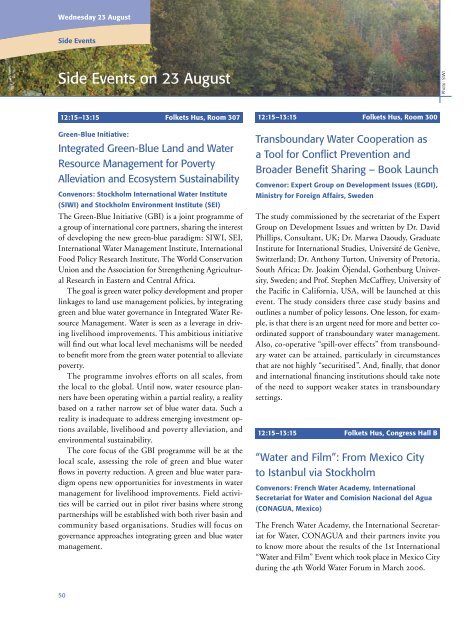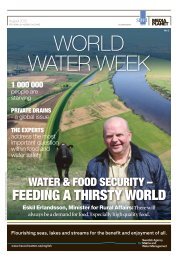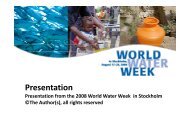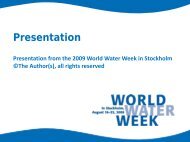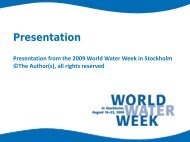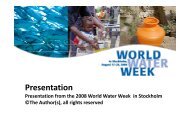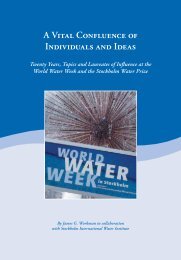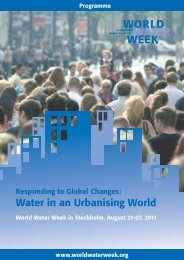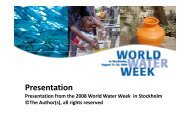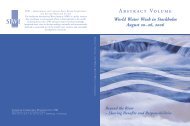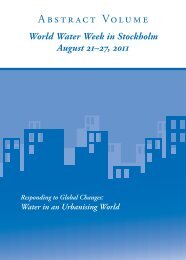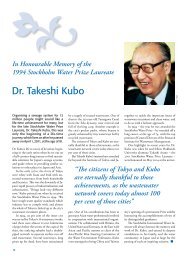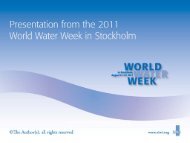Final Programme Beyond the River - World Water Week
Final Programme Beyond the River - World Water Week
Final Programme Beyond the River - World Water Week
You also want an ePaper? Increase the reach of your titles
YUMPU automatically turns print PDFs into web optimized ePapers that Google loves.
Wednesday 23 August<br />
Side Events<br />
Side Events on 23 August<br />
Photo: SIWI<br />
12:15–13:15 Folkets Hus, Room 307<br />
Green-Blue Initiative:<br />
Integrated Green-Blue Land and <strong>Water</strong><br />
Resource Management for Poverty<br />
Alleviation and Ecosystem Sustainability<br />
Convenors: Stockholm International <strong>Water</strong> Institute<br />
(SIWI) and Stockholm Environment Institute (SEI)<br />
The Green-Blue Initiative (GBI) is a joint programme of<br />
a group of international core partners, sharing <strong>the</strong> interest<br />
of developing <strong>the</strong> new green-blue paradigm: SIWI, SEI,<br />
International <strong>Water</strong> Management Institute, International<br />
Food Policy Research Institute, The <strong>World</strong> Conservation<br />
Union and <strong>the</strong> Association for Streng<strong>the</strong>ning Agricultural<br />
Research in Eastern and Central Africa.<br />
The goal is green water policy development and proper<br />
linkages to land use management policies, by integrating<br />
green and blue water governance in Integrated <strong>Water</strong> Resource<br />
Management. <strong>Water</strong> is seen as a leverage in driving<br />
livelihood improvements. This ambitious initiative<br />
will find out what local level mechanisms will be needed<br />
to benefit more from <strong>the</strong> green water potential to alleviate<br />
poverty.<br />
The programme involves efforts on all scales, from<br />
<strong>the</strong> local to <strong>the</strong> global. Until now, water resource planners<br />
have been operating within a partial reality, a reality<br />
based on a ra<strong>the</strong>r narrow set of blue water data. Such a<br />
reality is inadequate to address emerging investment options<br />
available, livelihood and poverty alleviation, and<br />
environmental sustainability.<br />
The core focus of <strong>the</strong> GBI programme will be at <strong>the</strong><br />
local scale, assessing <strong>the</strong> role of green and blue water<br />
flows in poverty reduction. A green and blue water paradigm<br />
opens new opportunities for investments in water<br />
management for livelihood improvements. Field activities<br />
will be carried out in pilot river basins where strong<br />
partnerships will be established with both river basin and<br />
community based organisations. Studies will focus on<br />
governance approaches integrating green and blue water<br />
management.<br />
12:15–13:15 Folkets Hus, Room 300<br />
Transboundary <strong>Water</strong> Cooperation as<br />
a Tool for Conflict Prevention and<br />
Broader Benefit Sharing – Book Launch<br />
Convenor: Expert Group on Development Issues (EGDI),<br />
Ministry for Foreign Affairs, Sweden<br />
The study commissioned by <strong>the</strong> secretariat of <strong>the</strong> Expert<br />
Group on Development Issues and written by Dr. David<br />
Phillips, Consultant, UK; Dr. Marwa Daoudy, Graduate<br />
Institute for International Studies, Université de Genève,<br />
Switzerland; Dr. Anthony Turton, University of Pretoria,<br />
South Africa; Dr. Joakim Öjendal, Go<strong>the</strong>nburg University,<br />
Sweden; and Prof. Stephen McCaffrey, University of<br />
<strong>the</strong> Pacific in California, USA, will be launched at this<br />
event. The study considers three case study basins and<br />
outlines a number of policy lessons. One lesson, for example,<br />
is that <strong>the</strong>re is an urgent need for more and better coordinated<br />
support of transboundary water management.<br />
Also, co-operative “spill-over effects” from transboundary<br />
water can be attained, particularly in circumstances<br />
that are not highly “securitised”. And, finally, that donor<br />
and international financing institutions should take note<br />
of <strong>the</strong> need to support weaker states in transboundary<br />
settings.<br />
12:15–13:15 Folkets Hus, Congress Hall B<br />
“<strong>Water</strong> and Film”: From Mexico City<br />
to Istanbul via Stockholm<br />
Convenors: French <strong>Water</strong> Academy, International<br />
Secretariat for <strong>Water</strong> and Comision Nacional del Agua<br />
(CONAGUA, Mexico)<br />
The French <strong>Water</strong> Academy, <strong>the</strong> International Secretariat<br />
for <strong>Water</strong>, CONAGUA and <strong>the</strong>ir partners invite you<br />
to know more about <strong>the</strong> results of <strong>the</strong> 1st International<br />
“<strong>Water</strong> and Film” Event which took place in Mexico City<br />
during <strong>the</strong> 4th <strong>World</strong> <strong>Water</strong> Forum in March 2006.<br />
50


